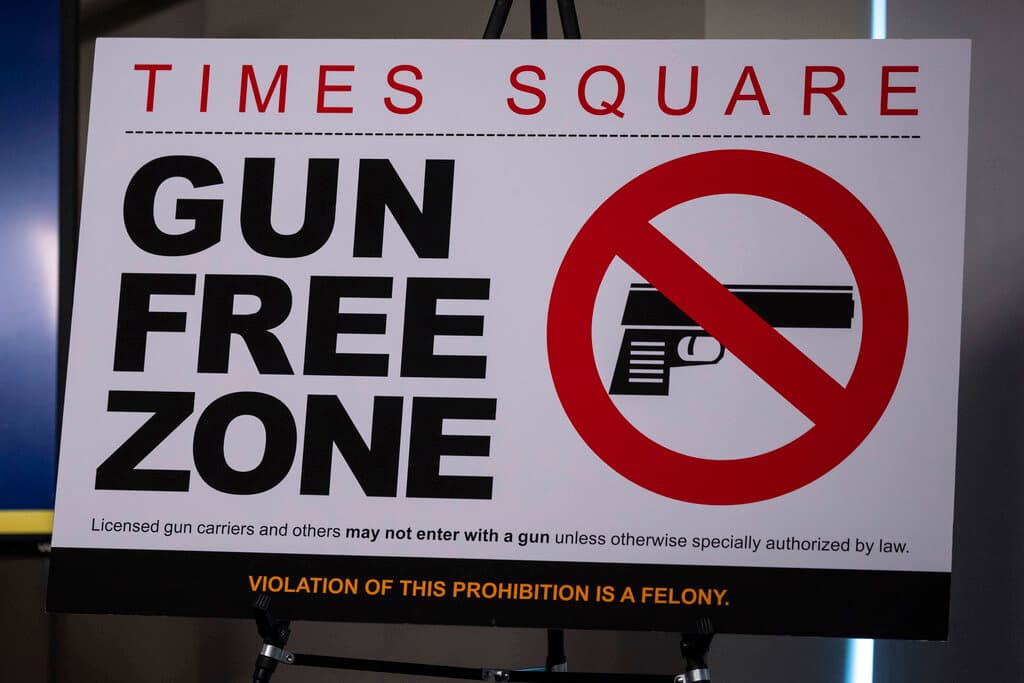Gun Rights Groups Pledge Further Legal Challenges to New York Gun Law
‘A lot of this law would probably survive even if there is a plaintiff with standing,’ one analyst tells the Sun. ‘If it is litigated on the merits it could be years and years.’

A federal judge may have dismissed legal attempts to block New York’s newest gun regulations from going into effect, but gun rights advocates say their efforts against the law are only beginning.
Last week, a federal court in Albany rejected an attempt by gun rights advocates to stop the rollout of New York’s Concealed Carry Improvement Act before it took effect September 1. Judge Glenn Suddaby issued the ruling despite calling parts of the new law unconstitutional.
“While pursuing the laudable goal of public safety, and in an attempt to curb ever-increasing mass shootings, the New York State Legislature has generated an unconstitutional statute in the CIAA,” Judge Suddaby wrote.
Now, a representative of an organization that brought the case, the senior vice president of the Gun Owners of America, Erich Pratt, tells the Sun. “We have 30 days to officially file an appeal, and we definitely plan to do so within that time frame.”
Mr. Pratt’s case was filed at the same time as two others, one in the Western District of New York and one in the Southern District of New York. They were all filed before the law took effect on September 1.
The other two cases are likely to meet the same fate as Mr. Pratt’s, according to the New York County Lawyers Association president, Vincent Chang. Because the cases were brought before the law was even in effect it will be hard to demonstrate that any of the parties that brought the complaints have a “concrete interest” in the matter, he said.
A new lawsuit filed in the North District of New York may be able to avoid this procedural problem, however.
The case, brought by the New York State Rifle and Pistol Association, will be a rematch of sorts for the case that went all the way to the Supreme Court, NYSRPA v. Bruen.
The previous case, decided over the summer, resulted in New York’s century-plus-old Sullivan Act being ruled unconstitutional. The new lawsuit is aiming to achieve the same ends with the Concealed Carry Improvement Act.
“It’s a comprehensive suit that is well written and was written by the same people that wrote our previous lawsuit,” a representative of the organization tells the Sun. “Generally we expect our case to go forward.”
They identified the “sensitive places” portion of the law as being particularly vulnerable, though they are hoping to have the entire act thrown out.
The “sensitive locations” portion of the law forbids firearms in certain places such as public transportation, libraries, bars, schools, and specific areas such as Times Square in New York City.
Although location-based regulation has been upheld by the Supreme Court in the past, critics of New York’s law argue that the new standard in the Empire State is overbroad.
“A lot of this law would probably survive even if there is a plaintiff with standing,” Mr. Chang tells the Sun. “However, the court did express skepticism on the sensitive location portion of the law — a court could find that it does sweep too broadly as it does suggest.”
The law also requires applicants to complete a 16-hour class, list their social media accounts from the last three years, disclose the names of anyone they live with, and provide at least four character references.
The requirement to list social media accounts is part of a section that requires applicants to be of “good moral character,” which has also fallen unders scrutiny.
The president of the Crime Prevention Research Center, John Lott, who is a gun rights advocate, tells the Sun, “The new New York law clearly ignores the Supreme Court decision in Bruen.”
“The court ruled that the state must set objective rules for permitting, but the ‘good moral character’ provision is extremely vague and allows much subjective judgment,” he said. “The law also flagrantly ignores the court’s restrictions on gun-free zones.”
Mr. Lott said he is unsurprised by the standing issue in the previous lawsuit, but says that “there will soon be plaintiffs who have standing,” an opinion shared by Mr. Chang.
Mr. Chang, however, warns that the court’s decision may not be as sweeping as plaintiffs hope.
“A lot of this law would probably survive even if there is a plaintiff with standing,” he tells the Sun. “If it is litigated on the merits it could be years and years.”

